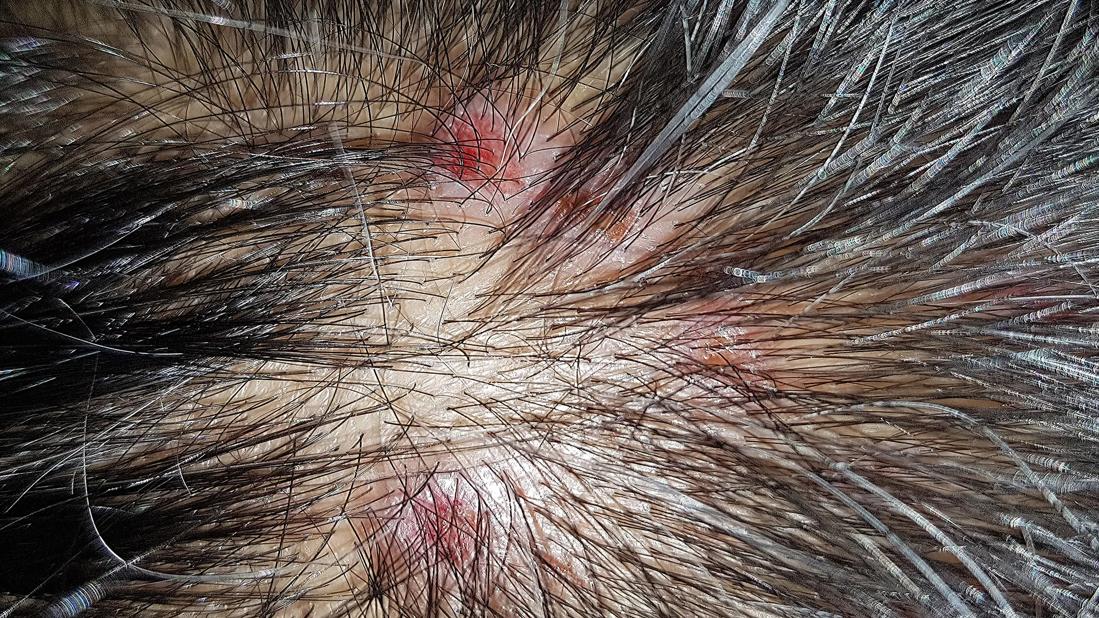Injury, itching, inflammation and irritants can all lead to scabs on your scalp

Image content: This image is available to view online.
View image online (https://assets.clevelandclinic.org/transform/290afeaf-c963-43e7-95a5-4befd3757cea/scabs-on-scalp-1567257028)
Scabs on a scalp with hair
Scabs on your scalp can be unexpected and unsettling. But it’s important to identify and treat the underlying causes so you don’t further irritate the area and make it worse. Internal medicine physician Manjaree Daw, MD, explains some of the most common causes for scabs on your scalp and how to prevent further injury.
Advertisement
Cleveland Clinic is a non-profit academic medical center. Advertising on our site helps support our mission. We do not endorse non-Cleveland Clinic products or services. Policy
Scabs on your scalp form as part of your body’s natural healing process to stop bleeding and keep germs out. Some of the most common causes of scalp scabs include:
Scabs can form anywhere on your body, but they can be particularly troublesome when they form on your scalp.
“We’re hampered by the hair on our scalp and it always gets in the way,” says Dr. Daw. “Sometimes, scabs can be hidden and you don’t even know you have them, and sometimes, they can progress without you really knowing they are there.”
Treatment for scalp scabs varies depending on the underlying cause. Often, doctors will prescribe some form of topical corticosteroids or antihistamines to help with inflammation and to stop the itching sensation that often results in the formation of scabs.
During treatment, do whatever you can to avoid causing further breaks in your skin. These superficial wounds could increase your risk of a bacterial infection.
“Bacterial infections can be painful and cause fevers, redness and discharge,” reiterates Dr. Daw. “Treatment for a bacterial infection requires antibiotics.”
Advertisement
If your scalp is irritated from an allergic reaction to an ingredient or product, avoiding the product completely usually resolves the issue. You can reduce the likelihood of dermatitis herpetiformis flare-ups, for example, when you cut gluten out of your diet.
But for the most part, if you see or feel something on your scalp that concerns you or you’re dealing with any other symptoms, you should let a provider know.
“You should see a doctor if something is not healing, painful, bleeding or discharging, and if you feel something new on your scalp that’s not going away with treatment,” advises Dr. Daw.
“If we can examine the scabs on your scalp and talk to you about the history you’ve had with this issue, we can figure out what’s causing these issues and provide you with some relief.”
Advertisement

Sign up for our Health Essentials emails for expert guidance on nutrition, fitness, sleep, skin care and more.
Learn more about our editorial process.
Advertisement
Leg-related symptoms indicate DVT, while chest symptoms point to a pulmonary embolism
Eczema triggers are different for everyone, but there are some common ways to manage flare-ups, like using a humidifier and fragrance-free creams
Over-the-counter antifungal creams usually get the job done, but it’s important to keep it from spreading in the meantime
Although it could be used as a moisturizer, this new trend is not recommended
The popular skin care ingredient can help smooth, brighten and strengthen your skin
Babies are born with very little of this vitamin, which plays a critical role in the blood clotting process
Medications, vitamin deficiencies and age can make you bruise more easily
It’s a great disinfectant for around your home, but not for your skin
Although it could be used as a moisturizer, this new trend is not recommended
Communicating clear limits helps protect your time, energy and emotional well-being
High cholesterol can be genetic, but testing and treatment can lower your heart disease risk